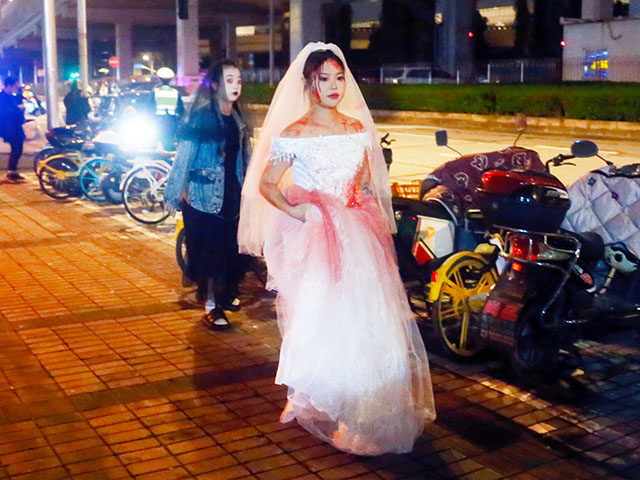Young people in Shanghai, China, took to the streets in Halloween costumes over the weekend despite rainy weather and a grumpy ban on holiday decorations, costumes, and anything with “horror or violence-related elements.”
Shanghai’s revelers made a point of defying those bans, turning out in costumes that ranged from period Chinese garb to horror movie icons, superheroes, and Japanese anime characters.
Some of them went political, dressing as horrors from the past of Communism like Joseph Stalin and Vladimir Lenin, or festooning their costumes with cheeky modern-day political slogans. One popular choice was “Save the Leeks,” a meme that became popular about six years ago, mocking the Chinese government’s tendency to view its people as crops to be harvested.
Bemused foreign media observers spotted several Donald Trump masks. Shanghai police turned out in force to punish costume ban violations and a Trump cosplayer was among the first they arrested, as seen in a viral video.
One Shanghai resident explained to Radio Free Asia (RFA) that Shanghai officials are “worried about large gatherings, particularly spontaneous ones.”
A Taiwanese-born bar owner said he was contacted by the police and told “there were to be no Halloween activities, no displays, and nobody in weird costumes, on pain of them shutting the bars down.”
“It was so sad,” the bartender commented.
Shanghai, a city of great financial importance with extensive international connections, has been the scene of civil disobedience a few times in the recent past, including demonstrations against dictator Xi Jinping’s abusive coronavirus lockdowns.
Some revelers tried taking their costumes to nearby cities, only to discover they were also enforcing costume bans. A resident of southern China calling himself “Chen” – everyone speaking to foreign media requested anonymity – told RFA the Chinese Communist Party has come to fear masks and costumes as signs of rebellion.
“The costumes they wear express dissatisfaction, and such dissatisfaction can easily evolve into a demonstration,” Chen said.
“The Communist Party knows that ‘a spark can start a prairie fire’ and that many young people are now unemployed and unable to find jobs,” a Shanghai woman named “Ma” told Voice of America News (VOA).
Ma said a “large number of police forces” were deployed in Shanghai because “they are worried that some of the freethinking young people will protest against the government in a strange way on Halloween.”
“Young people are indeed rebellious, but because of the education we have received since childhood, most Chinese young people dare not, and are unlikely, to rebel,” she said.
“In a normal, civilized society, the police maintain the safety of the people. In our case, it’s the opposite,” another disappointed Shanghai resident said.
RFA noted a particular concern of the Communist regime was Sunday’s anniversary of the death of former premier Li Keqiang, who challenged Xi for leadership long ago and fell out of favor.
Some Chinese suspected Li was bumped off by Xi and his loyalists. Others discovered that theatrical outpourings of grief for Li were a clever way to criticize Xi’s poor leadership on the economy without invoking China’s vast censorship apparatus.
One year later, heavy police deployments were noted at locations associated with Li, such as his former home in the city of Hefei. The authorities might have cracked down on Halloween costumes with exceptional vigor because they feared Halloween celebrations might turn into politically-charged Li Keqiang memorials.
Political analyst Chen Daoyin told VOA that Chinese young people are, in a sense, cosplaying as Westerners on Halloween, no matter what fanciful character or silver-screen monster they might imitate.
“Most people, especially young people who dress up as characters on festivals like Halloween, have usually adopted Western culture, or at the very least know that people in Western systems have the freedom of expression,” Chen explained.
“We have opinions about the current situation and the government, and can make our voices heard, but we also know that this is not allowed in the current political environment in China. Everyone knows what is going on. So they express their dissatisfaction with the authorities through dressing up as characters,” he said.
As usual in China, the police crackdown on demonstrations was accompanied by a surge of Internet censorship. Chinese social media users complained that posts about Halloween in Shanghai disappeared as quickly as they could be written, especially if they included photos.

COMMENTS
Please let us know if you're having issues with commenting.